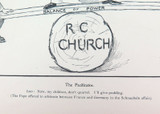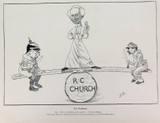Description
In his capacity as a cartoonist for the Bulletin Newspaper in Sydney from 1886 to 1888, Phil May satirized all aspects of Australian & Commonwealth issues, commenting on current conditions in the Commonwealth, Australian Federation, Pacific Islands politics, Chinese labor, the New Hebrides question, Caricatures of famous political figures and Aborigines. He was outspoken about the way Aboriginal & Islander people were treated by Governments & Religious groups. The book was limited to 975 copies. This satirical line block print is from the 1904 1st edition book “Phil May in Australia” by The Bulletin Newspaper Company Limited, Sydney MCMIV. The page measures 31cms x 24.5cms & is lightly hinged to acid free white backing. It’s in great condition.
The satirical caricature is entitled “The Pacificator”. Depicts the Roman Catholic Pope at the time, Pope Leo offering to mediate between France & Germany over the Schnaebele Affair. Refer below.
Schnaebele Affair
On April 21, 1887, the French Havas news agency published a dispatch to the effect that Schnaebelé, a mid-level and obscure French police inspector, had been arrested by two agents of the German secret police on the Franco-German frontier near Pagny-sur-Moselle, as he was on his way to Ars-sur-Moselle for a meeting with the German police inspector there, at the latter's request. A dispute followed as to whether the arrest had taken place on French or on German territory (see "Account of incident" below); but regardless, the French claimed that under the circumstances Schnaebelé was entitled to immunity even if on German territory, since he had been invited to a conference by German officials. The reason given by the German authorities for the arrest was that in a previous inquiry into charges of treasonable practices against a number of Alsatians, evidence had been produced that Schnaebelé was involved in transmitting to Paris information as to German fortresses, furnished by Alsatians in the pay of the French Government, and that an order had been given to arrest him if ever he should be found on German soil. In other words, the Germans believed Schnaebelé to be a spy.
Within a week of his arrest, on April 28, Schnaebelé was released by order of the German Emperor William I. In a dispatch of the same date to the French ambassador at Berlin, Bismarck explained that, although the German Government considered, in view of the proofs of guilt, the arrest to be fully justified, it was deemed expedient to release Schnaebelé on the ground that business meetings between frontier officials "must always be regarded as protected by a mutually-assured safe conduct." Thus ended the Schnaebelé incident.
The week-long incident, between April 21 and 28, had such threatening and provocative language from both sides, as to cause serious concern of war. A large section of the German press demanded that Germany make no concession. In France, the Cabinet voted 6 to 5 against an ultimatum demanding the release of Schnaebelé with an apology, which would almost certainly have meant war, as had happened with the Ems Dispatch in 1870. The proposed ultimatum had been put forward by French war hawk and Minister of War Georges Ernest Boulanger, who also brought in a bill to mobilise an army corps.
After Schnaebelé's release and Bismarck's letter, many in the French public thought Bismarck backed down, because he was afraid of Boulanger which increased Boulanger's rising star as a national hero and bolstered his image as a "Revenger" for France against Germany. However, it was, in truth, an embarrassment to the Republican government, who knew the French army was no better off than in 1870, when Germany quickly defeated it in the Franco Prussian War — Boulanger's antagonism's against Germany during the week long crisis was indeed a danger to the Republic. For this and other reasons, on July 7, 1887 Boulanger was released as Minister of War and dispatched by the government to a provincial post to be hopefully forgotten, but not before admiring throngs tried to stop his train from leaving Paris: loyal to his military orders, he was smuggled out in a switched engine.
Reviews (0)
Be the first to review this product.
Additional Info
- Condition:
- Used
- Shipping:
- $8 (Fixed Shipping Cost)









